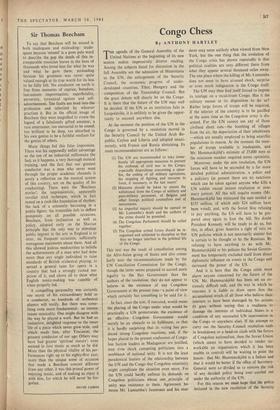Sir Thomas Beecham
To say that Beecham will be missed is both inadequate and misleading: inade- quate because 'missed' is a poor pale word to describe the gap the death of this in- comparable musician leaves in the lives of thousands who loved him for what he was and what he gave them; misleading because his greatness was never quite valued enough at its true worth for its loss to be fully felt. No conductor on earth is free from moments of caprice, boredom, last-minute improvisation, superficiality, perversity, tyrannical egoism and self- advertisement. The faults are bred into the profession and inherited by whoever practises it. But in the official image of Beecham they were magnified to create the legend of a fabulously gifted amateur, a rare entertainer, too mercurial to be sound, too brilliant to be deep, too absorbed in his own genius to be a faithful medium for the genius of others.
Many things fed this false impression. There was his supposedly unfair advantage as the son of an industrial millionaire (he had, as it happens, a very thorough musical training, and the fact that our greatest conductor was a man who never went through the proper academic channels is surely a reflection on the musical system of this country, not on the quality of his conducting). There were the 'Beecham stories'; the impressionistic, apparently cavalier stick technique, which in fact rested on a rock-like foundation of rhythm; the lack of a solemnity becoming in a public figure; the irresistible itch to deflate pomposity on all possible occasions. Beecham, from inclination as well as policy, adopted early on the Shavian principle that the only way to stimulate public interest in the arts in England is to utter, on frequent occasions, sufficiently outrageous statements about them. And all this allowed jealous mediocrities to belittle the achievements of a man who had done more than any single individual to raise standards of British orchestral playing, to spread a general taste for opera in a country that had a strongly rooted sus- picion of it, and above all to show what English music-making was capable of when properly led.
A compelling personality was certainly one secret of his extraordinary hold as a 'conductor, as hundreds of orchestral players will testify. But there was some- thing even more fundamental: an intense innate musicality. One might disagree with the way he played a work. But he had an instinctive, delighted response to the inner life of a piece which never grew-stale, and which made him, after Toscanini, the greatest conductor of our age. Others may have had greater 'spiritual stature'; none seemed to love music as much as he did. More than the physical vitality of his per- formances right up to his eighty-first year, more than the unique sense of occasion that made a Beecham concert different from any other, it was this primal power of enjoying music, and of making us enjoy it with him, for which he will never be for- gotten.






































 Previous page
Previous page